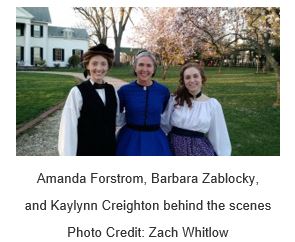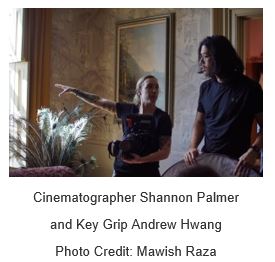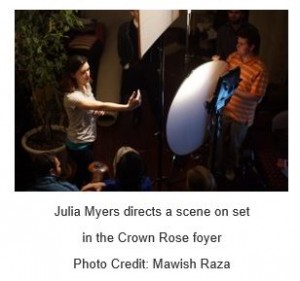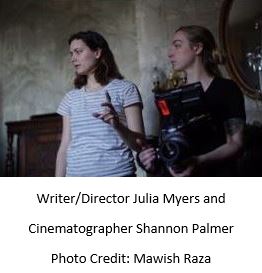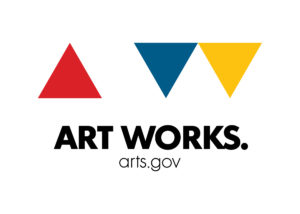by Flo Dwek
UNION tells the story of a father who must face his past when his daughter, a surgeon in the Union Army, returns home for Christmas with an unexpected guest—a soldier on whom she operated. The film, to be released later this year, is inspired by real-life historical figures. The heroine, Sophie–played by Amanda Forstrom–is loosely based on Dr. Mary E. Walker, a Union surgeon. Dr. Walker is the only woman to receive the Congressional Medal of Honor. She was a physician, women’s rights advocate, and dress reformer. The Invalid Corps, or Veterans Reserve Corps of the Civil War, inspired the character William, played by Zack Rukavina. The Invalid Corps were wounded and disabled Union soldiers who served their country in noncombat roles for the duration of the war.
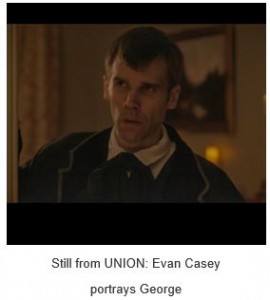
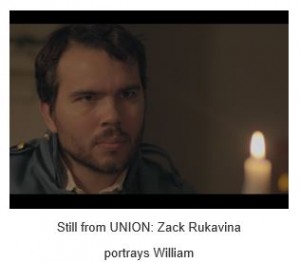
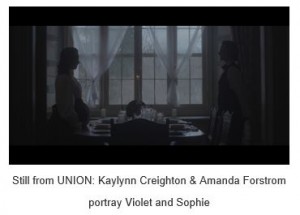
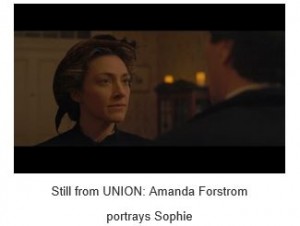
WIFV:
What made you set out to do a film about the Civil War period?
Myers:
When I was young, I learned about battles and events in history class, and I thought it was all very dry. I resolved that I was not one of those “history people.” It wasn’t actually until after college, when I started hearing stories from friends about people who did incredible things in their daily life, and happened to live at a different time, that I became fascinated.
I realized these were real people — yet inaccessible in this intriguing way, since we can no longer talk to them. It was a form of fantasy for me, a mystery to be unraveled, imagining worlds where different laws and expectations exist and these characters must make these high stakes decisions. It really is so similar to fantasy storytelling, except it happens to be real. That is why I love using history as inspiration.
My friend and colleague, Day Al-Mohamed (a WIFV member as well), told me about the Invalid Corps in the Civil War, which you learn about in UNION, and also in the documentary she is currently working on, which I am helping her edit. I loved how both the Invalid Corps and the story of Mary Walker dealt with underrepresented perspectives, and I found that a good foundation to build up from.
In many ways, the period element is what makes it fun and challenging. But the issues it tackles, disability perception and women’s rights, transcend any time period.
WIFV:
Who produced it and will it be distributed to theaters?
Myers:
It is being produced through my production company, GreenRobe Productions. We are excited to submit it to upcoming film festivals and to screen it both locally and in other theaters in the US.
WIFV:
How would you characterize the film – as a feature, docudrama, or historical period piece?
Myers:
UNION is an intimate family drama set during the Civil War. It is inspired by historical events and people, but it is ultimately a fictional piece that tells its own story.
WIFV:
Did you direct and also write the film script?
Myers:
Yes, I wrote the script, which was an arduous process (isn’t it always?), and then transitioned into directing it. While there is a lot to be said for having separate approaches to the writing and the directing, I think if you are going to do it yourself, there are also great advantages. You have an intimate awareness of the subtleties in the script already and what you will need from your actors. You truly have a vision, and a “hearing” (the auditory version of a vision.) The best part of the experience by far was seeing the characters come to life through the actors, and working with them on the emotional motivations for the lines and actions. I was able to jump into that much more quickly and confidently because I had the story so ingrained in me over the past year of writing and re-writing it.
WIFV:
How did you learn about women surgeons? Tell us more…how many of them were there at that time? Were they formally accredited as surgeons by a medical school?
Myers:
I similarly learned about Mary Walker through Day Al-Mohamed, and then did my own research to learn more. She is truly a unique woman, as by the accounts I have read she was the only woman surgeon to have been employed by the Army during the Civil War. She attended Syracuse and obtained her official medical degree. Other women did get medical degrees and were involved to a certain extent in the war, but it was usually in a nursing or training capacity. See civilwarwomenblog.com/civil-war-women-doctors for descriptions of Mary Walker and other incredible women with medical degrees during the Civil War.
WIFV:
Tell us a little bit about the views and values of the day. How did people react to female surgeons out in the battlefield? What challenges and hardships did they face?
Myers:
Mary Walker fought to be recognized as a true surgeon for many years. According to reports (see civilwarwomenblog.com/civil-war-women-doctors again for story details), upon the outbreak of the Civil War in 1861, she immediately went to Washington, DC and visited the Secretary of War at the time, Simon Cameron. Her attire — dress with slacks — did not help her case and he dismissed her. I imagine he laughed.
Generally, the view was that women should never be appointed above the position of nurse. Mary served as a nurse for a while, and volunteered as she would not be formally employed. Some surgeons saw her gifts and reached out on her behalf, but she was still unable to receive proper recognition. At long last, she was appointed acting assistant surgeon in the US Army for the 52nd Ohio Volunteers. And she was paid for it.
Lincoln himself did not grant Mary Walker employment as a surgeon at the beginning, because it was just too unlike the traditions of the time. It takes a long time to change views. Consider that today the situation seems obvious, but in the 1860s, it was completely unlike anything that had ever happened before. In many ways, it is like the transgender issue of our time.
I enjoyed giving the character Sophie, who is inspired by Mary Walker, a foil in her fictional sister, Violet. Violet is, in many ways, the classic, domestic wife who always wants to do the right thing. Their interactions highlight how far Sophie goes against the grain.
WIFV:
Were Civil War “nurses”(professionals and volunteers alike) pressed into action to perform surgery because so many wounded soldiers needed immediate attention?
Myers:
No, as far as I know, nurses would not perform actual surgeries or amputations, as they were not skilled in the complex process. These surgical procedures, however, required people to assist with such tasks as holding tools, restraining, and cleaning; and those are areas in which the nurses would take part. What is amazing is that even in great need, the army was still against hiring women. However, just having a qualified woman surgeon in the first place was already extremely uncommon.
WIFV:
Tell us a bit about the plot. Was it based on a true to life story? Or was it a fictional account? A kind of historical reenactment?
Myers:
The story centers on a young woman surgeon, Sophie, inspired by Mary Walker, who visits home after serving in the war. In the story, she brings with her a young man who has also served, and who has lost his arm.
While the story is greatly inspired by historical stories, diary accounts from a member of the Invalid Corps, and information about Mary Walker, it is still a fictional story. Mary Walker was never engaged to or married to a member of the Invalid Corps. She was married to someone in her medical program, but later divorced.
I felt strongly about setting the story in a believable time that was as accurate as possible, but also allowing myself the creative license to explore an intriguing imaginary circumstance — that a character much like Mary Walker was engaged to a man serving in the Invalid Corps.
To me the intersection of women’s rights issues and disability issues — two areas of the Civil War that go largely undiscussed — creates an opportunity for incredible tension. There are multiple layers to explore as we see how the family reacts to both these unconventional characters’ identities. And trust me, there are even more layers to the story that get revealed as it goes along. But you’ll have to watch to see! The bottom line is no one is really who we immediately think they are.
WIFV:
What did you set out to achieve by dramatizing the protagonists’ “love” story?
Myers:
By bringing together two characters who went so very much against the norm of the time, I was able to explore a unique bond. Amanda Forstrom, who plays Sophie, said it best: “I love the fact that Sophie and William [the soldier] are “outsiders” in their society, and share a unique perspective in that. In this shared struggle, they find a deep connection and a new vision for the future.”
Also, while the story revolves around this relationship between Sophie and William, UNION is largely about Sophie’s relationship with her father, Alvah. The father-daughter bond is something I was excited to explore, as it is something I share very deeply with my own father.
WIFV:
Tell us about the cast–How did you find the right actors for the story?
Myers:
It took a long time to find the right actors for the story. I knew what I wanted in terms of the acting style, and it was something very unique and subtle. It demanded a great amount of commitment, focus, and ability from every single actor. The way I wrote the script was incredibly nuanced (not hitting you over the head) and it is truly an ensemble piece, with six characters that need to own their roles. Fortunately, I found six professional actors who impressed me immeasurably each day on set and took it to that next level.
WIFV:
I understand that the actor who plays the soldier in the film is missing an arm. Did you find that remarkable, to have found someone who fit the bill?
Myers:
Personally, I didn’t really see the point in making this movie unless I could find someone who was a gifted actor and actually missing his arm. It felt counterproductive to tell this story that makes the very points it does and not be authentic about it in the casting. It was certainly very difficult to find an actor who was actually missing his arm, who had immense talent, and was the right fit for the role, and I was discouraged from the search by some people.
But I am truly glad we stuck with it for the several months it took, because we found a perfect fit in Zack, and I wouldn’t have it any other way.
WIFV:
Where did you shoot Union, and who assisted you with the period sets and cinematography?
Myers:
We filmed Union at Crown Rose Estate in Knoxville, MD, near Frederick. The house was a perfect setting for this story, particularly because it served as a respite for doctors during the Civil War.
Zach Whitlow, a museum professional and Civil War living historian, assisted with our props and set decoration, ensuring that the visual elements in the film were as historically accurate as possible. Zach’s knowledge was invaluable to me, as well as that of the other historians consulted for the film.
My cinematographer, Shannon Palmer, was absolutely vital to this process. She brought a beautiful approach to the depiction of the characters and sets, especially to the moods of each scene. We had a fantastic “simpatico” relationship, without which I never would have succeeded in bringing this challenging project to life. The trust I had in her allowed me to focus on capturing the subtleties of the actors’ performances and conveying the emotional arc of the story.
WIFV:
When will we be able to see this captivating film?
Myers:
The film will be completed in the next few months. We will need to examine the rules for various festivals in terms of screenings, but it is my hope to hold screenings in the fall of this year.
WIFV:
At your young age of 26, with such an impressive film in progress, is there anything you would like to add or say to our WIFV audience, particularly to those who are just starting out as filmmakers?
Myers:
Anything from the outside seems impressive, like someone has just wolfed down a giant task in one fell swoop. I have had several people tell me that the film looks impressive and they seem almost intimidated by the elements, including the fact that it is a period piece with horses, SAG actors, etc. I would just say that doing a larger, complex project really comes down to doing a long string of incredibly small, unexciting tasks.
When it’s done, it’s flashy, but when it’s happening, it’s painful and requires you sit through all the parts you don’t enjoy and just keep going. There’s so much: payroll tax, forms, schedules, phone calls, Ebay ordering, being told you are wrong, delegating, messing up delegating, taking responsibility for things you did not do because you are the leader, apologizing, failing…and it just goes on from there. This project took ages to come together, but it did, one tiny piece at a time. The key is to be willing to do the unglamorous bits, to remember that no one has any idea what they are doing, and to just… keep…going.
